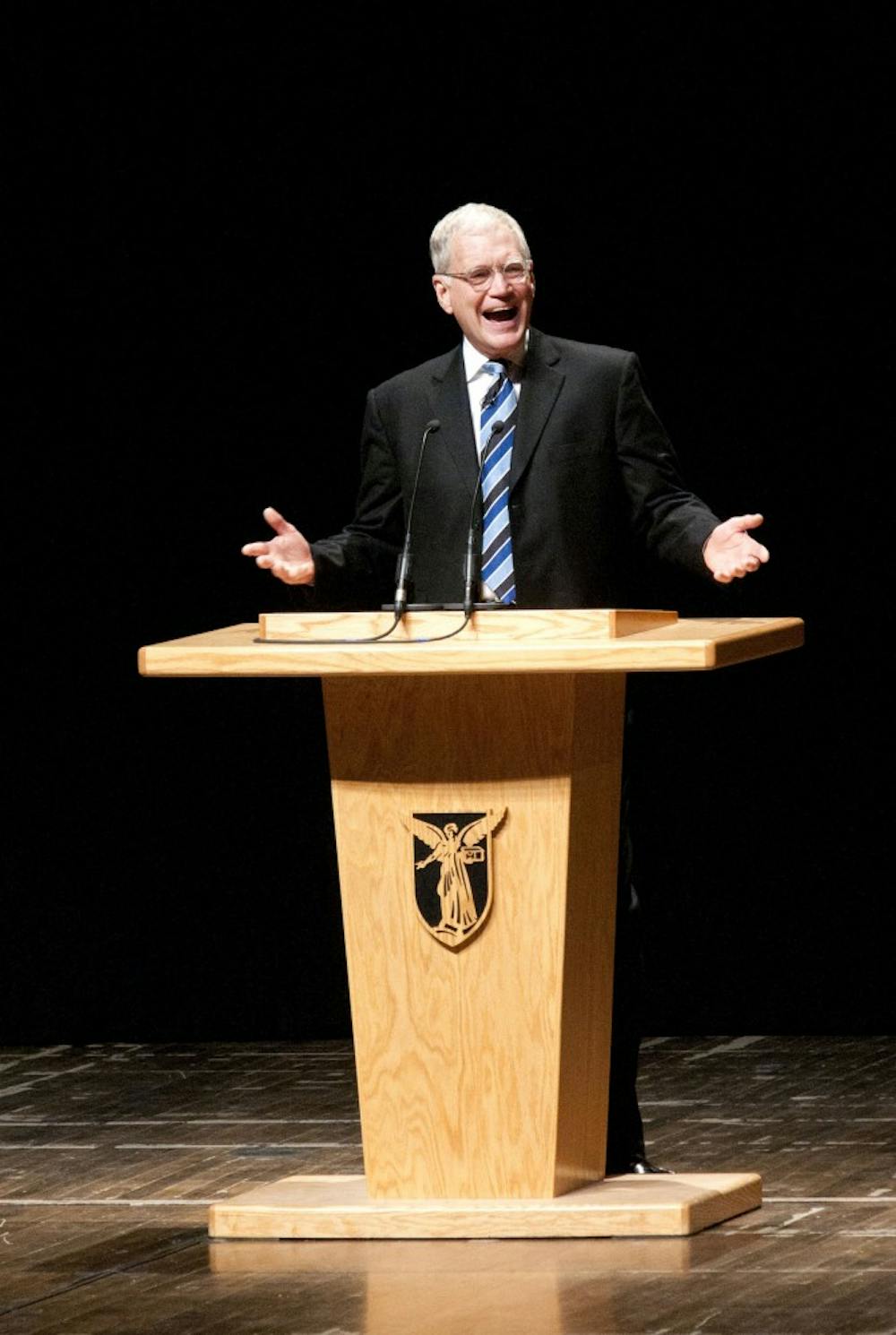• David Letterman announced his immanent retirement in 2015.
• Letterman graduated from Ball State in 1970 with a bachelor’s in telecommunications.
• The dean of the College of Communication said Letterman's lecture series helps expand a Ball State education.
The man called “Ball State’s most famous alumnus,” announced his imminent retirement in 2015 last week.
David Letterman spoke during Thursday’s taping of the “Late Show” about retiring next year when his contract expires.
“And I phoned [Leslie Moonves, president and chief executive officer of CBS Corporation] just before the program and I said, ‘Leslie, it’s been great, you’ve been great, and the network has been great, but I’m retiring,” Letterman said to the audience in the Ed Sullivan Theater, according to a press release.
He said to the audience that there is not a timetable for his retirement, but he will retire, “sometime in the not too distant future.”
“I just want to reiterate my thanks for the support from the network all the people that have worked here, all of the people in the theater ... thank you very much,” Letterman said.
Letterman graduated from Ball State in 1970 with a bachelor’s in telecommunications and returned in 2007 to attend the dedication for the building carrying his name.
“I can’t tell you how thrilled I am to be on the Ball State University campus today,” Letterman told the cheering crowd Sept. 7, 2007. “If I had any way of knowing this was going to happen, I would have studied much harder.”
Roger Lavery, dean of the College of Communication, information and media said when Letterman came to campus he made one thing clear, he was here for students.
“He really just wanted to meet with the students,” Lavery said. He said Letterman arrived wearing baggy shorts, a T-shirt and sandals as if to say “we are here to relax.”
In 2000 students showed their appreciation to Letterman’s dedication by sending him a card with more than 10,000 signatures after he had heart bypass surgery.
Letterman is recognized in the telecommunications department with the David Letterman Scholarship, which awards three telecommunications majors or minors each year with scholarships of $10,000, $5,000 and $3,333, respectively. The scholarship is based on the creation of a projects, instead of grades.
“I struggled through college,” Letterman said at the building’s dedication. “I graduated, barely, with a 2.0 grade point average. If reasonable people could put my name on a $21 million building, anything is possible.”
Letterman isn’t just good for bringing in funds for the university, Lavery said, but he also raises the profile of Ball State.
“You know, you can’t even put a price on the value of that,” he said.
Lavery said Letterman himself proves that nearly anything is possible.
“The truth is I think about [Letterman’s career is], any student in Indiana that [goes] to Ball State, if you are gifted, there is not much you can’t do. He proved it.” Lavery said. “... The message being, you can do anything you want, and I love that he is the proof”
President Jo Ann Gora said in 2007 that she considers Letterman an accomplished and loyal alumnus.
“David is an ever present presence in students’ minds,” she said. “They know that he and Jim Davis are two of our most famous alumni. Our TCOM students really identify with Dave, with the success he has, because he started in radio at Ball State.”
Letterman has had a long standing commitment to Ball State. Barry Umansky, faculty adviser for WCRD and professor of telecommunications, said had it not been for Letterman, the university’s student-run radio station WCRD would not be where it is today.
Umansky said Letterman wrote a check to invest in a carrier current station, which uses power lines to amplify radio waves. This eventually led to the success of the completely student-run organization. “It all started because David Letterman thought it would be useful for students to have their own radio station,” he said.
“Had Letterman not done what he did, we would not be marching toward what they are today.”
Umansky said when Letterman returns to campus, he always stops by the station.
“There is this one microphone in studio A that he always uses,” he said. “Students look at it with envious eyes.”
Letterman also is known on campus for his lecture series, which brings guests like newscaster Ted Koppel, Twitter cofounder Biz Stone and TV hosts Rachel Maddow and Oprah Winfrey.
Umansky said he uses the lectures as a chance for his students to learn something new. He said the series, which he equates to elongated TED talks, gives students a chance to learn outside the classroom.
“I think that series has added a lot to the experiences of students and faculty as well,” he said. “[The lectures] make you a more educated person.”
Lavery said he hopes Letterman’s retirement will allow him to have more connections with Ball State.
“It would be wonderful if he wanted to come back every year, the students always gives him the warmest welcome,” he said. “I’m going to want to hold out hope that he will keep Ball State in his plans.”


